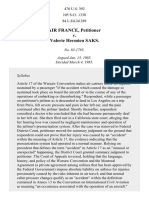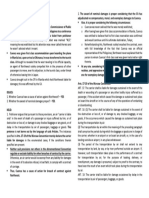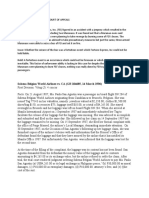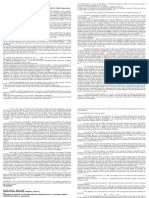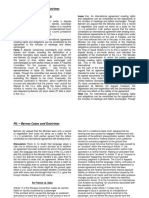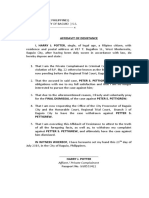2 Significant Features of These Provisions
Uploaded by
Raf Ruf2 Significant Features of These Provisions
Uploaded by
Raf RufArticle 17
"The carrier shall be liable for damage sustained in the event of the death or wounding
of a passenger or any other bodily injury suffered by a passenger, if the accident which
caused the damage so sustained took place on board the aircraft or in the course of any
of the operations of embarking or disembarking."
Article 18
"(1) The carrier shall be liable for damage sustained in the event of the destruction or
loss of, or of damage to, any checked baggage or any goods, if the occurrence which
caused the damage so sustained took place during the transportation by air."
2 Significant Features of these Provisions
1. Article 17 imposes liability for injuries to passengers caused by an "accident,"
whereas Article 18 imposes liability for destruction or loss of baggage caused by
an "occurrence."
2. The text of Article 17 refers to an accident which caused the passenger's injury,
and not to an accident which is the passenger's injury.
"The word 'accident' is not a technical legal term with a clearly defined meaning.
Speaking generally, but with reference to legal liabilities, an accident means any
unintended and unexpected occurrence which produces hurt or loss. But it is often used
to denote any unintended and unexpected loss or hurt apart from its cause; and if the
cause is not known, the loss or hurt itself would certainly be called an accident. The
word 'accident' is also often used to denote both the cause and the effect, no attempt
being made to discriminate between them." (1903,Lord Lindley)
However, in Article 17, the drafters of the Warsaw Convention apparently did make an
attempt to discriminate between "the cause and the effect"; they specified that air
carriers would be liable if an accident caused the passenger's injury. The text of the
Convention thus implies that, however we define "accident," it is the cause of the injury
that must satisfy the definition, rather than the occurrence of the injury alone.
The text of the Convention consequently suggests that the passenger's injury must be
caused by an unexpected or unusual event.
You might also like
- Art 17 of Warsaw Convention, Duration of LiabilityNo ratings yetArt 17 of Warsaw Convention, Duration of Liability24 pages
- Warsaw Convention Montreal Convention Date of Effectivi TY ScopeNo ratings yetWarsaw Convention Montreal Convention Date of Effectivi TY Scope5 pages
- Group 1 Warsaw and Montereal ConventionNo ratings yetGroup 1 Warsaw and Montereal Convention28 pages
- Air France v. Saks, 470 U.S. 392 (1985)No ratings yetAir France v. Saks, 470 U.S. 392 (1985)13 pages
- Note On Air Carrier Liability Law in India For Ministry of Civil AviationNo ratings yetNote On Air Carrier Liability Law in India For Ministry of Civil Aviation17 pages
- The Warsaw Convention and The Montereal ConventionNo ratings yetThe Warsaw Convention and The Montereal Convention2 pages
- The Tokyo Convention, 1963 The Geneva Convention, 1948No ratings yetThe Tokyo Convention, 1963 The Geneva Convention, 194832 pages
- What Are The Limitations To The Liability of Air Carriers?No ratings yetWhat Are The Limitations To The Liability of Air Carriers?27 pages
- Constantine Evangelinos v. Trans World Airlines, Incorporated, 550 F.2d 152, 3rd Cir. (1977)No ratings yetConstantine Evangelinos v. Trans World Airlines, Incorporated, 550 F.2d 152, 3rd Cir. (1977)19 pages
- The Extent of Liability Imposed by The Warsaw Convention On International Air CarriersNo ratings yetThe Extent of Liability Imposed by The Warsaw Convention On International Air Carriers4 pages
- Sabena Belgian World Airlines vs. CA (GR 104685, 14 March 1996)No ratings yetSabena Belgian World Airlines vs. CA (GR 104685, 14 March 1996)14 pages
- First Division (G.R. No. 71929: December 4, 1990.) 192 SCRA 9 ALITALIA, Petitioner, vs. INTERMEDIATE APPELLATE COURT and FELIPA E. PABLO, RespondentsNo ratings yetFirst Division (G.R. No. 71929: December 4, 1990.) 192 SCRA 9 ALITALIA, Petitioner, vs. INTERMEDIATE APPELLATE COURT and FELIPA E. PABLO, Respondents38 pages
- Tsui Yuan Tseng, Plaintiff-Appellant-Cross-Appellee v. El Al Israel Airlines, LTD., Defendant-Appellee-Cross-Appellant, 122 F.3d 99, 2d Cir. (1997)No ratings yetTsui Yuan Tseng, Plaintiff-Appellant-Cross-Appellee v. El Al Israel Airlines, LTD., Defendant-Appellee-Cross-Appellant, 122 F.3d 99, 2d Cir. (1997)14 pages
- Katherine Thomas v. Continental Casualty Company, 225 F.2d 798, 10th Cir. (1955)No ratings yetKatherine Thomas v. Continental Casualty Company, 225 F.2d 798, 10th Cir. (1955)4 pages
- Catherine E. MacDonald v. Air Canada, 439 F.2d 1402, 1st Cir. (1971)No ratings yetCatherine E. MacDonald v. Air Canada, 439 F.2d 1402, 1st Cir. (1971)4 pages
- John J. Demarines and Doris A. Demarines, Husband and Wife v. KLM Royal Dutch Airlines, 580 F.2d 1193, 3rd Cir. (1978)No ratings yetJohn J. Demarines and Doris A. Demarines, Husband and Wife v. KLM Royal Dutch Airlines, 580 F.2d 1193, 3rd Cir. (1978)15 pages
- Stanley Abramson v. Japan Airlines Co., LTD, 739 F.2d 130, 3rd Cir. (1984)No ratings yetStanley Abramson v. Japan Airlines Co., LTD, 739 F.2d 130, 3rd Cir. (1984)8 pages
- Julio Jose Martinez Hernandez v. Air France, 545 F.2d 279, 1st Cir. (1976)No ratings yetJulio Jose Martinez Hernandez v. Air France, 545 F.2d 279, 1st Cir. (1976)8 pages
- Jesse JR L. Galias LLB-2 Damages For Breach of Contract of Common CarriersNo ratings yetJesse JR L. Galias LLB-2 Damages For Breach of Contract of Common Carriers7 pages
- CASE DIGEST Povey V Qantas Airways LimitedNo ratings yetCASE DIGEST Povey V Qantas Airways Limited3 pages
- Chapter II_ International Status and Navigation of Warships and MNo ratings yetChapter II_ International Status and Navigation of Warships and M27 pages
- Eastern Airlines, Inc. v. Floyd, 499 U.S. 530 (1991)No ratings yetEastern Airlines, Inc. v. Floyd, 499 U.S. 530 (1991)20 pages
- John Lisi, Etc. v. Alitalia-Linee Aeree Italiane, S.P.A., 370 F.2d 508, 2d Cir. (1966)No ratings yetJohn Lisi, Etc. v. Alitalia-Linee Aeree Italiane, S.P.A., 370 F.2d 508, 2d Cir. (1966)10 pages
- US Aviation v. Fitchburg-Leominster, 42 F.3d 84, 1st Cir. (1994)No ratings yetUS Aviation v. Fitchburg-Leominster, 42 F.3d 84, 1st Cir. (1994)8 pages
- The Air Carriers Liability in Cases of Unknown Cause of Damage INo ratings yetThe Air Carriers Liability in Cases of Unknown Cause of Damage I32 pages
- Edgardo G. de Leon,: Regional Trial CourtNo ratings yetEdgardo G. de Leon,: Regional Trial Court4 pages
- 3 AFFIDAVIT OF Consolidation of Ownership Pacto de Retro SaleNo ratings yet3 AFFIDAVIT OF Consolidation of Ownership Pacto de Retro Sale2 pages
- Cross Examination of Catalino "Lino" S. BartolomeNo ratings yetCross Examination of Catalino "Lino" S. Bartolome1 page
- New Provision On The Probation Law (Must Memorize)No ratings yetNew Provision On The Probation Law (Must Memorize)8 pages
- Accused-Appellant.: People of The Philippines, Plaintiff-Appellee, vs. Gonzalo BaldogoNo ratings yetAccused-Appellant.: People of The Philippines, Plaintiff-Appellee, vs. Gonzalo Baldogo16 pages










